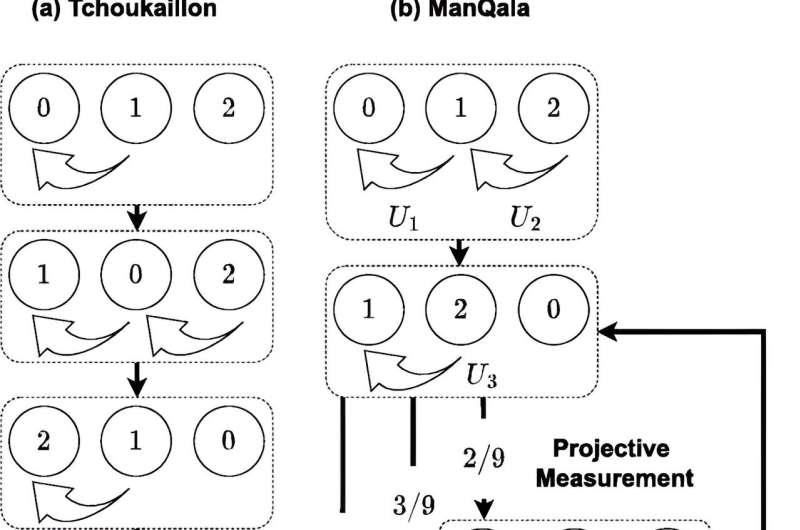This article has been reviewed according to Science X's editorial process and policies. Editors have highlighted the following attributes while ensuring the content's credibility:
fact-checked
peer-reviewed publication
trusted source
proofread
How an ancient board game could unlock cutting-edge physics discoveries

The game mancala may have originated as far back as 6000 BCE in Jordan and is played around the world to this day. It consists of stones that players move between a series of small pits on a wooden game board. The point of the game is to get all the stones into the last pit at the end of the board.
In a new study published in AVS Quantum Science, researchers at Tulane University apply a modified solitaire version of mancala, which they call ManQala, to quantum state engineering, a field of quantum physics that deals with putting quantum systems into specific states.
The central problem quantum state engineering is trying to solve, said Ryan Glasser, associate professor of physics at the School of Science and Engineering, is "what do I need to do to get my quantum system to be in the state I desire?" Essentially, researchers need to know how to get particles to be in certain places or have certain energies in order to study them and to use quantum computers.
This is more difficult with quantum particles than it is with, for instance, the stones on a mancala board. "Quantum things are, generally speaking, very delicate and difficult to control," said Glasser. "The system can fall apart quickly and make you lose any quantum advantage you have or desire to have."
Quantum physicists already have a few methods to solve these problems, but the simulations researchers did in this study showed that ManQala is more effective, even in simpler systems. "We see advantages already, even in these simplified systems of three stones and three pits," said Glasser.
This study is one of many in the field of quantum games, which is "effectively taking normal games like sudoku or checkers or tic-tac-toe and applying rules of quantum physics to them and seeing what interesting things might happen," said Glasser. When dealing with quantum particles rather than physical stones, there is the opportunity for the particles to interfere with each other when they are in neighboring "pits." This means that there are more moves available, and for ManQala, at least, "you can win the game if you use quantum rules where you wouldn't be able to if you use classical rules," Glasser said.
Although this study focused on simulations, Glasser is optimistic about future applications of ManQala. "It's in the realm of theory currently, but I think it's definitely doable experimentally," said Glasser. He hopes to apply ManQala to the IBM Quantum cloud computer, which he has used for research in the past, along with fellow researchers Thomas Searles of the University of Illinois Chicago and Brian Kirby, an adjunct professor of physics at Tulane.
More information: Onur Danaci et al, ManQala: Game-inspired strategies for quantum state engineering, AVS Quantum Science (2023). DOI: 10.1116/5.0148240
Journal information: AVS Quantum Science
Provided by Tulane University





















